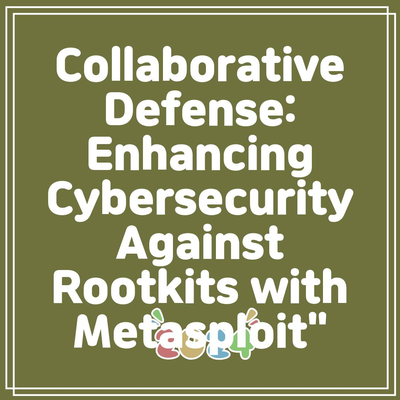
Unlocking Rootkits: Collaboration with Metasploit
The world of cybersecurity is continually evolving, with threats and vulnerabilities becoming more sophisticated. Among the most concerning threats are
The Rise of Rootkits
The term ‘rootkit’ is derived from the Unix/Linux terminology ‘root’, which refers to the highest level of access within a computer system. A rootkit is designed to enable continued privileged access to a computer while concealing its presence, making it challenging to detect using ordinary security measures. They can be implemented in various ways, including software modifications, kernel-level functionality, or by exploiting legitimate tools. The advent of sophisticated rootkits has made protecting against them increasingly difficult.
Recent reports have shown a surge in rootkit usage as cybercriminals capitalize on vulnerabilities within systems. This spike is alarming; as rootkits can enable a range of malicious activities such as data exfiltration, system corruption, and even complete control over a compromised device. The challenges posed by these malicious tools require innovative solutions and collaborations in the cybersecurity community to address and mitigate the risks efficiently.
Partnership with Metasploit
As a well-known open-source penetration testing framework, Metasploit has gained traction among security professionals for its versatility in testing vulnerabilities and developing security solutions. By aligning with researchers and developers focusing on rootkits, Metasploit aims to enhance the detection and remediation of these dangerous tools. This partnership includes a collaborative effort to build new modules specifically designed to target rootkits, improving the efficacy of current detection methods.
The collaboration promotes not only the development of new strategies but also a knowledge-sharing culture within the cybersecurity field. By leveraging Metasploit’s extensive capabilities, security professionals across industries can enhance their toolsets to combat the complexities posed by rootkits. This is a significant step forward as it brings together various experts who can share invaluable insights, thereby strengthening overall cybersecurity measures.
Implications for Cybersecurity
The collaboration between Metasploit and security professionals opens new avenues for combating rootkit threats. By developing and sharing specific attack vectors to identify and disable rootkits, organizations worldwide can bolster their defenses. The implications extend beyond just detection; they involve building proactive measures that can prevent rootkits from infiltrating systems in the first place.
Furthermore, as these developments take shape, businesses and organizations are encouraged to prioritize cybersecurity training sessions. Understanding the nature and functionality of rootkits, as well as how to use advanced frameworks like Metasploit, empowers cybersecurity teams to be more effective. Enhanced knowledge means teams can react swiftly, minimize damage, and uphold the integrity of their systems.
The Road Ahead
Looking forward, the cybersecurity landscape will inevitably experience further challenges as rootkits evolve. The need for collaboration, knowledge sharing, and continuous innovation has never been more critical. Metasploit’s involvement in the fight against rootkits is just one example of how the cybersecurity community can come together to enhance defenses against emerging threats.
As technology advances, so will the techniques employed by cybercriminals. This evolving nature makes it essential for cybersecurity professionals to stay updated on the latest trends. They must also embrace new tools and partnerships to remain resilient. Continuous education and collaboration will be vital in thwarting rootkit threats and ensuring organizational security.
Conclusion
The partnership between Metasploit and experts dedicated to rootkit research serves as a beacon of hope in the ongoing battle against cyber threats. By focusing on disabling rootkits effectively and improving detection methods, this collaboration significantly enhances the cybersecurity framework. It highlights the importance of shared goals and the collective effort needed to safeguard against increasingly complex cyber threats.
As the cybersecurity landscape evolves, organizations must remain vigilant and proactive in addressing vulnerabilities. Investing in knowledge, security tools, and collaboration will allow them to navigate the challenging terrain presented by rootkits and other malicious threats effectively. The future of cybersecurity rests on unity and innovation, offering a path forward in this crucial battle.


